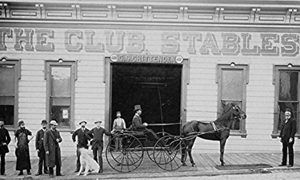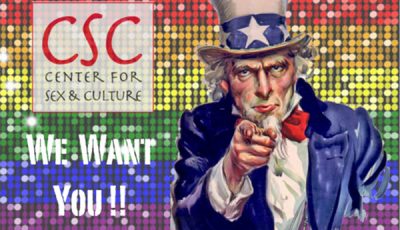100 Years of the Sex Worker’s Rights Movement IN SF
 SAN FRANCISCO, CA – On January 25th, join the Tenderloin Museum and the Center for Sex & Culture to celebrate the 100th anniversary of San Francisco’s 1917 sex worker march. On January 25th, 1917 Reggie Gamble and Maude Spencer, two madams of the Uptown Tenderloin red light district, organized a demonstration against the planned Valentine’s Day eviction of San Francisco’s brothels. Targeting anti-vice reformer Rev. Paul Smith, nearly 300 prostitutes stormed the reverend’s church and took over the pulpit, demanding that the congregation hear their concerns. Reggie Gamble’s speech, which was covered by every one of the city’s major newspapers, demanded economic justice and a halt to the looming evictions that threatened to displace the thousands of sex workers that lived and worked in San Francisco’s vice districts. The 1917 march, the first of its kind in the United States, sits alongside the protests at San Francisco’s Compton Cafeteria and the New York’s Stonewall Inn as important historical events reclaimed by communities, and an important milestone in the struggle for sex worker’s rights.
SAN FRANCISCO, CA – On January 25th, join the Tenderloin Museum and the Center for Sex & Culture to celebrate the 100th anniversary of San Francisco’s 1917 sex worker march. On January 25th, 1917 Reggie Gamble and Maude Spencer, two madams of the Uptown Tenderloin red light district, organized a demonstration against the planned Valentine’s Day eviction of San Francisco’s brothels. Targeting anti-vice reformer Rev. Paul Smith, nearly 300 prostitutes stormed the reverend’s church and took over the pulpit, demanding that the congregation hear their concerns. Reggie Gamble’s speech, which was covered by every one of the city’s major newspapers, demanded economic justice and a halt to the looming evictions that threatened to displace the thousands of sex workers that lived and worked in San Francisco’s vice districts. The 1917 march, the first of its kind in the United States, sits alongside the protests at San Francisco’s Compton Cafeteria and the New York’s Stonewall Inn as important historical events reclaimed by communities, and an important milestone in the struggle for sex worker’s rights.
Help us set the tone for the new year in celebrating the centennial of this vital piece of Bay Area history. Our program will begin at the Tenderloin Museum, where authors Ivy Anderson and Devon Angus, co-editors of Alice: Memoirs of a Barbary Coast Prostitute, will give a talk examining the history of sex work in San Francisco from 1849-1917. Afterwards, members of the Erotic Service Providers Union (ESPU), the US PROStitutes Collective (US PROS), and Sex Workers Outreach Project (SWOP Bay Area) will address where we are at 100 years later in the continuing fight for sex worker’s rights. Following the presentations will be a march to the site of the original protest, at Leavenworth and O’Farrell Streets, where Reggie Gamble’s 1917 speech will be read by Carol Queen (founding director of the Center for Sex & Culture), along with speeches by some of the leaders of today’s sex worker’s rights movement. Following the march, we will gather to celebrate this centennial at the Gangway bar, located at 841 Larkin St.
100 Years of the Sex Worker’s Rights Movement will begin on Wednesday, January 25th at 5:30pm at the Tenderloin Museum. A $10 suggested donation will be taken at the door (no one turned away for lack of funds). Refreshments will be available. The procession to the original protest site, just two blocks from the Tenderloin Museum, will leave at 8:15pm. If you plan on attending the march, warm clothes, candles, and signs are encouraged.
Participant Bios:
The Tenderloin Museum celebrates the rich history of one of San Francisco’s most overlooked neighborhoods. Through history exhibitions, resident-led walking tours, community programs, and the presentation of original artwork, the Tenderloin Museum invites all comers to learn about the roots of our dynamic neighborhood, gather together with friends old and new, and reclaim our city’s past and future. The 31 blocks of the Tenderloin District are a microcosm of San Francisco, peopled by immigrants and iconoclasts, artists and activists, sinners and saints. All are welcome to join us in telling its story. www.tenderloinmuseum.org
Ivy Anderson and Devon Angus are the co-editors of Alice: Memoirs of a Barbary Coast Prostitute, winner of the California Historical Society Book Award. This memoir recalls the life of “Alice Smith,” a prostitute who worked across the state of California in the early 1900’s. The publication of her story in the San Francisco Bulletin in 1913 served as direct inspiration for the organization of the 1917 prostitute’s march. For more information, visit: www.voicesfromtheunderworld.com
The non-profit Center for Sex & Culture believes that sex is an essential part of human life, learning, and culture. Via our library, archives, art gallery, and event space, we preserve materials, promote learning, and provide resources related to sex and gender, their histories, and their intersection with the arts. When you support the CSC, you are also supporting the many sexual, LGBTQ, and artistic communities & individuals that depend on our physical space for a safe haven or rely on our resources to continue their mission. www.sexandculture.org
The Erotic Service Providers Union (ESPU) is by and for those who labor erotically to gain agency through industrial organizing for our occupational, social, and economic rights through affiliating with organized labor.
www.espu-ca.org
SWOP Bay is an open and informal support group in the SF Bay Area. Our goals are to help create space for our sex worker community. www.swopbay.org
The US PROStitutes Collective (US PROS) is a multiracial network of women who work or have worked in different areas of the sex industry. Founded in 1982, US PROS campaigns for the decriminalization of prostitution and for justice, protection and resources so that no woman, young person or man is forced into prostitution through poverty or violence. www.uspros.net
For more information on the 1917 march, you can read Gary Kamiya’s Chronicle article on the event here: http://www.sfchronicle.com/bayarea/article/Revolt-of-the-hookers-How-prostitutes-stared-6324339.php
Tenderloin Museum 398 Eddy Street, San Francisco, CA 94102 / 415.351.1912 / tenderloinmuseum.org / kconry@tenderloinmuseum.org
This event is sponsored in part by a grant from Grants for the Arts/General Fund Portion of the San Francisco Hotel Tax Fund.
Facebook: https://www.facebook.com/events/1810284865925747/
Photos from the 1917 demonstration are available on request.













